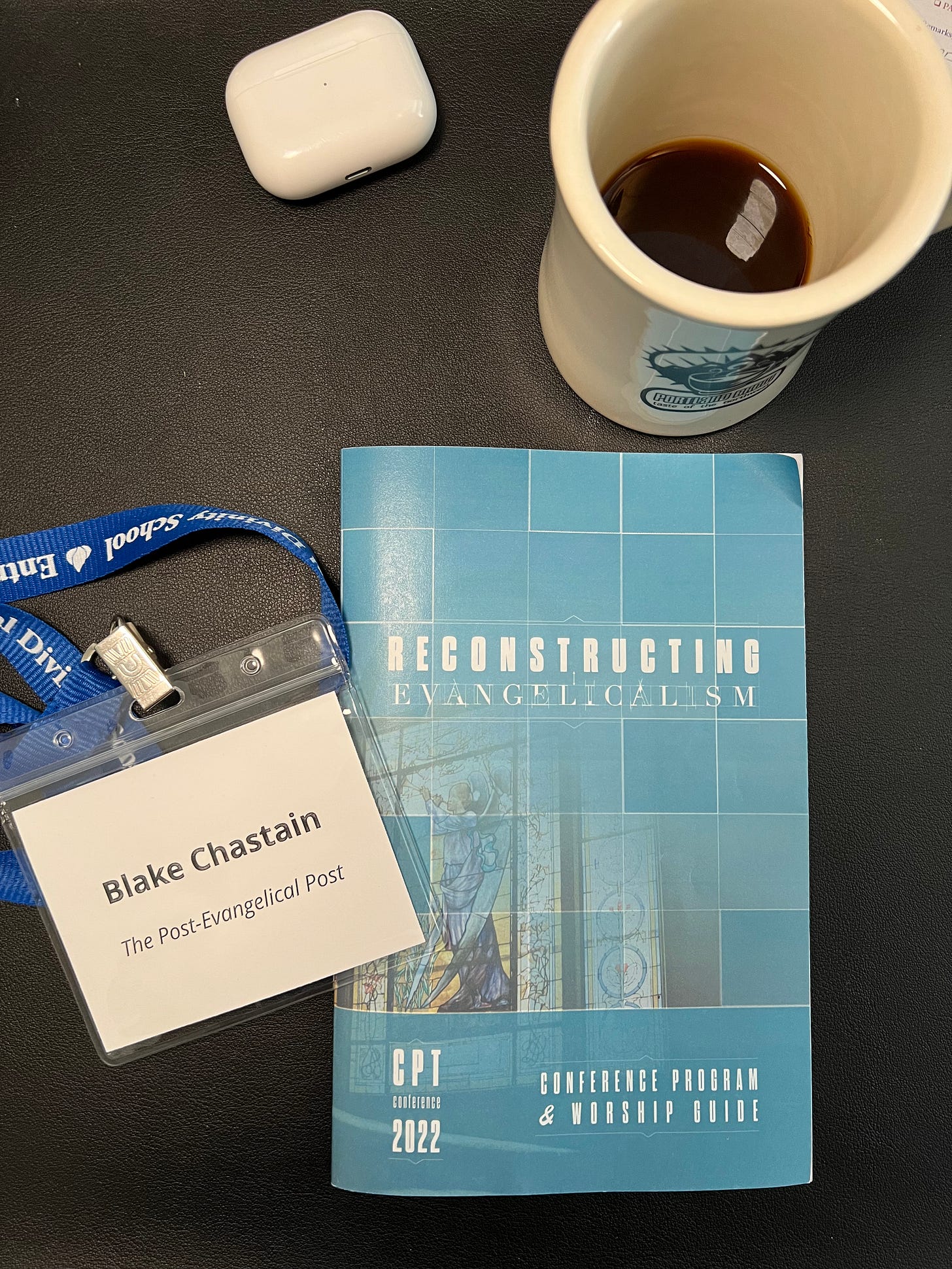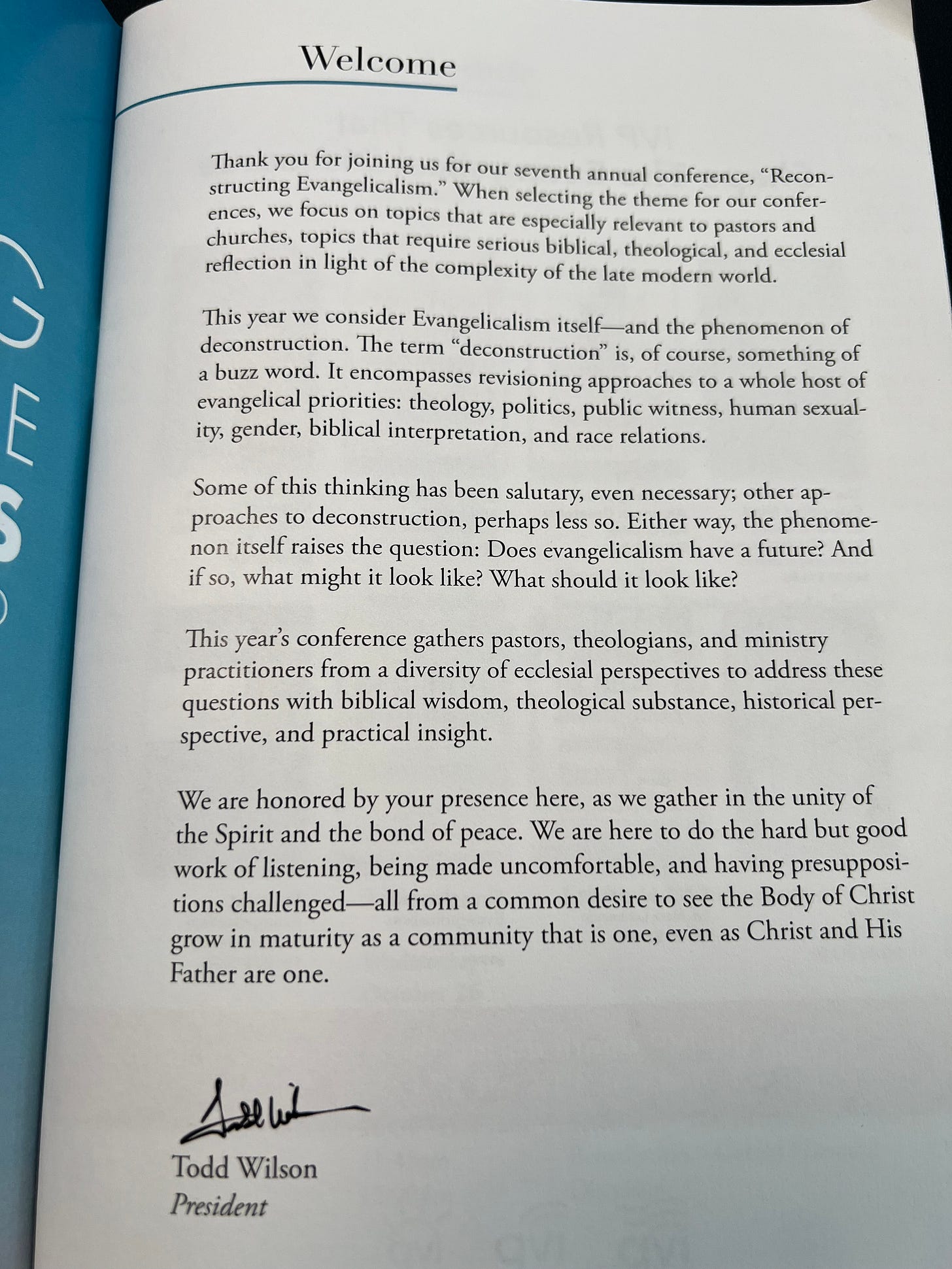On The "Reconstructing Evangelicalism" Conference: Overall Thoughts
This is Part 1 of 2. Part 2 will offer specific thoughts on panels.
This past week I attended portions of the “Reconstructing Evangelicalism” conference put on by the Conference for Pastor Theologians.
Due to family and work commitments, I was only able to attend portions of the conference on Monday and Tuesday; the conference went into Wednesday morning, and featured breakout sessions, plenary keynotes, and plenary panel discussions. In total, I was able to attend:
“Modern Evangelicalism and Global Christian Identity,” a breakout session by Douglas Sweeney
“What is Evangelicalism?,” a panel discussion moderated by Joel Lawrence including Elizabeth Conde-Frazier, Kristin Kobes Du Mez, Malcolm Foley, Gavin Ortlund, and Douglas Sweeney
A plenary session by Gavin Ortlund
“25 Years After The Scandal of the Evangelical Mind,” a short presentation by special guest Mark Noll, followed by a Douglas Sweeney-moderated panel including Vincent Bacote, Walter Kim, Russell Moore, Karen Swallow Prior, and Kevin Vanhoozer.
“Against Sentimentality: Towards a Truly Evangelical Antiracism,” a breakout session by Malcolm Foley
This is, admittedly, a limited number of the available sessions, panels, and keynotes. I had to miss presentations by Kristin Kobes Du Mez, Russell Moore, and Karen Swallow Prior due to other commitments. The conference site states that recordings will be made available after the fact for those who attended in-person, and I anticipate being able to watch them when they are made available.
What follows are some of my thoughts about the conference. As I mentioned on Twitter, I attended because I have a vested interest in how evangelicals perceive themselves—and because, despite all the water that has passed under the bridge since my last forays in evangelicalism in 2014, as David Bazan says “these are my people / we’re the same in so many ways.”
Overall Thoughts
Before getting into comments on specific presentations, I want to talk about a couple of general things that I noticed throughout.
Bebbington, Bebbington, Bebbington
The Bebbington Quadrilateral was regularly invoked. This irked me. The Bebbington Quadrilateral is…fine. (It’s no Wesleyan Quadrilateral.)
How it’s been used since its introduction, however, is by and large deflection by definition. Even some presenters pointed out that Bebbington’s definition was initially formulated to describe British evangelicalism in particular, before it was applied more broadly, from Noll’s first edition of The Scandal of the Evangelical Mind to Timothy Keller’s high-profile defense of evangelicalism in the pages of The New Yorker in 2017.
Which leads me to my next point.
Insider Audience, Insider Language
Any conference is self-selecting; this one is no different. While there, I had Julie Ingersoll comments about attending a creationist conference in mind, not because her own comments map 1:1 on the Reconstructing Evangelicalism conference, but how the conference sought to stake out a certain element of evangelicalism they see as worthwhile:
Instead, the conference served as an exercise in social formation; the building of a community though myth and ritual. The “myth” at issue is more than the creation narrative itself. In retelling the Genesis story, describing the fight to defend it, identifying the enemies of God, and ridiculing them as sinister and ungodly, the storytellers mark the boundaries of who is inside the group and who is not. The “myth” in question is the story of an embattled but faithful remnant, holding fast to God’s truth in the face of persecution. The ritual is the public enactment of the identity through storytelling.1
Often, it felt as if evangelicalism was talked about in largely theoretical or academic terms, which felt at odds with the goal of the conference to equip people in pastoral roles. In other moments, participants asking questions as well as presenters would invoke terms like “historic,” “orthodox,” and “traditional” Christianity to broadly reference conservative-to-moderate theological & ecclesial traditions that are compatible with evangelical preference.
Light On Deconstruction Talk
The conference was called “Reconstructing Evangelicalism,” but invoked “deconstruction” in its framing. In the sessions I was able to attend, few speakers addressed deconstruction directly—not the personal process of reckoning with inherited belief, not the questioning of social norms of evangelicalism, not the social fallout of losing networks of support.
The Spectre of Trump and Trumpism
There were oblique references to Trumpism throughout. Noll mentioned that some evangelicals wanted to “make America great again” but did not mention Trump by name. Yet Trump and those who support them were present throughout. I chose the word spectre intentionally - because it evokes an eerie sense of being watched by someone or something that isn’t physically present. To paraphrase Pam Beasley, I felt Trump in that conference:
There was a sadness to it, a sense of loss—though I am likely reading my own lifelong lament into this.
Not Merely White Evangelicalism
To the organizers’ credit, the speakers and panelists were not limited to White evangelical men.
Some speakers sought to downplay White American evangelicalism’s influence throughout the conference by appealing to the large number of evangelicals outside the US. Notably, however, those who most vociferously objected to the emphasis on and critique of White American evangelicalism were themselves White American evangelicals. From what I was able to attend, the speakers who were not White were more outspoken in their critiques of White American evangelicalism and more readily acknowledged and reckoned with its outsized influence on evangelicalism globally.
One reason I delineated what I attended above was to make clear that I could not attend several of the plenary sessions, and multiple breakout sessions happened simultaneously on each day of the conference. I do not lack the sincerity of anyone who attended or participated, and these are folks who are taking their faith seriously. I’ll have more to say about the sessions I attended in particular in Part 2, so be sure to subscribe:
This conference made clear there are other stakeholders besides White evangelical men in evangelical spaces and traditions. There are more people who want to “reclaim” a label, or “reconstruct” something that resembles the traditions they were raised in and continue to participate in. But the inability or unwillingness of White evangelical men to reckon with what they have done—certainly historically and perhaps personally—with their place of privilege among evangelical spaces will inhibit their ability to meaningful help “reconstruct” their traditions for the better.
Check back for Part 2 later.
Ingersoll, Julie J.. Building God's Kingdom (p. 127). Oxford University Press. Kindle Edition.







“But the inability or unwillingness of White evangelical men to reckon with what they have done—certainly historically and perhaps personally—with their place of privilege among evangelical spaces will inhibit their ability to meaningful help “reconstruct” their traditions for the better.”
This really hits for me, based on my experiences at similar conferences. White male privilege is overwhelming, yet goes unaddressed. I wonder about this, as evangelicals have been more willing to talk about racism (albeit haltingly and via marginal voices, primarily). What’s your take, Blake, on why sexism goes unacknowledged?